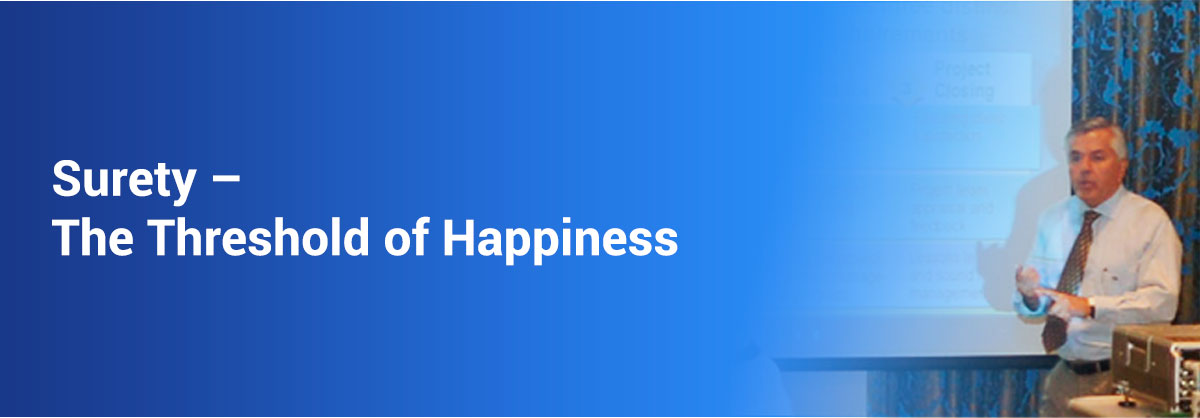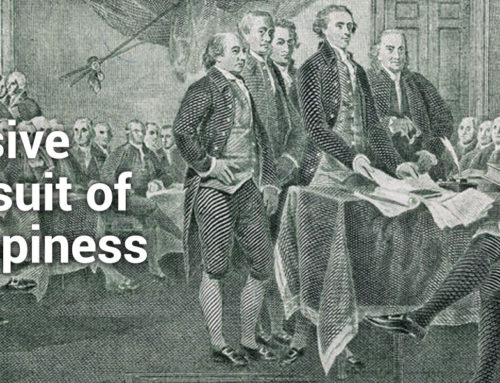In my previous blog post The Elusive Pursuit of Happiness, I made the case that happiness is not a goal or destination but a state of mind that can be chosen despite one’s circumstances in life. I proposed a definition building on the work of Maslow’s hierarchy of needs.
Happiness is not a goal or destination, but a state of mind that generates positive emotions fulfilling our basic need to “feel good” about ourselves; physically, mentally, emotionally and spiritually. The true measure of happiness is whether one truly feels good about himself despite his or her particular degree of material success, social prestige or life’s challenges.
In researching a wide range of philosophical, spiritual, psychological, and success literature, I have identified seven universal needs and desires that generate positive emotions that lead to a hierarchy of happiness.
- The physical need for surety
- The biological need for pleasure
- The mental need for worthwhile achievements
- The intellectual need for discovery
- The emotional need for meaningful and intimate relationships
- The spiritual need for belonging
- The foundational need for a healthy self-esteem
Each one of us is driven, consciously or unconsciously, by several of these basic needs. I believe that understanding these needs and satisfying them in responsible ways is the key to happiness. I have found that very few individuals are aware of what exactly makes them truly happy and spend precious little time trying to find out. In this Blog, I will elaborate on the first need; the physical need for surety.
The Need for Surety
I am using the term surety, which I learned from my army training in Chemical, Biological and Radiological (CBR) school, to mean the combination of safety and security. Man is an instinctive animal with a strong need for survival and self-preservation. Without some semblance of feeling safe, secure and in control, it is nearly impossible to generate positive emotions such as peace of mind, self-sufficiency, and a feeling of being happy.
The need for Surety is an amalgam of Maslow’s first two hierarchy of needs; physiological, and safety and security needs. As a reminder, physiological needs include items such as food, clothing, shelter and health that are essential for human life. Safety needs include protection from harm, either physically or emotionally. Security needs include a feeling confidence and hope in the future.
Surety is a threshold need. It is absolutely required in order to reach a primitive level of happiness. Food on the table, clothes on your back, roof over your head, freedom from pain and danger, and a feeling of being in control. The absence of any of these surety needs will preclude pursuing any additional desire other than survival.
Physical security includes protection from harm from external sources or poor health. It is almost impossible to be happy when you are in danger or experience physical pain. I can vividly remember the excruciating pain from a torn rotator cuff. I felt like my entire world revolved around my left shoulder. Most of us can relate to such a feeling whenever we had a toothache.
Emotionally security includes freedom from excessive worry, guilt, and fear. It is a natural phenomenon to experience some level of anxiety in one’s daily life, but when it becomes excessive, it can lead to debilitating pain.
National security includes the protection from the danger of foreign invasion of our country and way of life. It has always been a primary need of our government and in our constitution.
Social Security includes the supplementary financial support necessary to live with surety in retirement. It was established during a particularly insecure period in our history after the great depression and the start of World War II in which our way of life was threatened. In the 1941 State of the Union address, Franklin D. Roosevelt proposed four fundamental freedoms that people everywhere in the world should enjoy; freedom of speech, freedom of worship, freedom from want and freedom from fear.
Financial security is to have developed the skills to earn a sustainable living wage in a rapidly changing job market. In many ways, this is the driving force to modern survival.
Medical security is the ability to afford life sustaining medical treatments without causing bankruptcy. This is a subject of active debate in our country for good reason, as it directly affects peace of mind and a threshold of happiness.
The good news is that the vast majority of Americans and western democracies (but not all) have most all of these needs met. Warren Buffet is fond of saying that if you were born in the US, you have already won the lottery and are in the top ten percent of the safest and securest people on the planet.
Studies done at Princeton University have shown that there is a direct correlation between money and happiness up to an annual income of $75,000, after which the law of diminishing returns kicks in. Not surprising is the fact that this is considered the amount of income as a means of exchange to provide life’s basics of food clothing shelter and health care for a family.
If this is the case, why is it so hard to convince people that most of our surety needs are being met. Why don’t most of us espouse Bobby McFerrin’s philosophy, “Don’t Worry, Be Happy”. I think there are two major reasons. First, we are all competitive animals by nature and tend to compare ourselves to others that we perceive are better off than we are. The success of our economy is built on consumerism which requires all of us to desire the latest products; to “keep up” in order to feel satisfied. Rarely do we consider where we stand in relation to those who are worse off than we are. My father had a favorite quote that he would drill into us whenever he saw the slightest sign of envy or jealousy. “I once knew a man who complained that he had no shoes until he met a man who had no feet”. It was a reminder to be grateful for what we actually had rather than what we wished we had.
Second, there is a natural tendency to take for granted that which we already possess and seek new desires as an indication of progress. As mentioned above, there are several more human needs that can be desired once the threshold need for surety has been met. It is helpful when feeling that these additional needs are not being met to reflect on Warren Buffet’s statement and practice the emotion of gratitude for what you already have. I have heard so many elders say that they give thanks every morning just for being alive. It’s because they are more aware of how precious life is knowing that there is not much time left. Gratitude is saying grace before meals. “Thank you, lord, for these gifts we are about to receive”.
As we continue to delve into these seven universal needs, I will be emphasizing the value of wise choices; choosing the “must have’s” versus the “would like to haves”. When it comes to happiness, surety is a “must have”. There is a sense of well-being and peace of mind that comes from feeling in control of your personal safety and security. Provided you don’t have a toothache!
If the subject of Designing your life to achieve both happiness and success is of interest to you, sign up here for my newsletter.



Leave A Comment